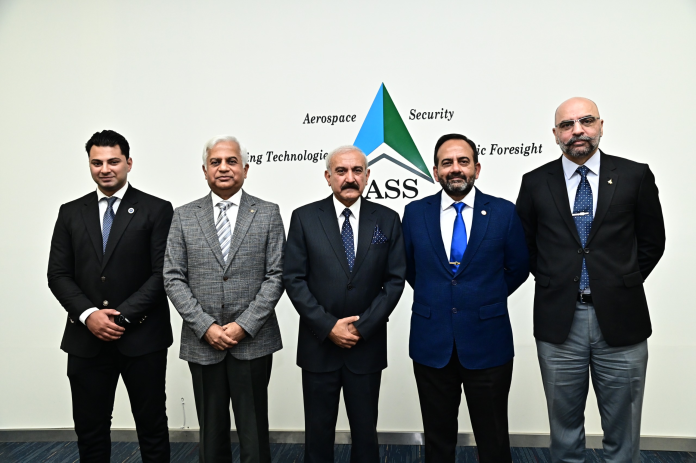ISLAMABAD, DEC 11 (DNA):The Centre for Aerospace & Security Studies (CASS), Islamabad, concluded a roundtable on the ‘Wings of Influence: Air Power’s Role in Recent Conflicts.’ The roundtable brought together high-ranking military professionals to analyse the use of air power in contemporary conflicts over the past two years, its operational evolution, and its profound impact on modern warfare.
The moderator of the roundtable, Air Vice Marshal Nasser ul Haq Wyne (Retd), Director (Aerospace Warfare) at CASS, set the stage for the discussions by pointing to the pivotal role of air power in modern warfare, shaped by rapid technological advancements and evolving geopolitical landscapes. He highlighted how air power has become a critical factor in influencing conflict outcomes and guiding military strategy.
In his Keynote Address on ‘Future of Air and Space in National Defence and the Global Innovation Economy’, Air Marshal Zulfiquar Ahmed Qureshi, explored the transformative role of unmanned systems, precision-guided munitions and space-based intelligence in reshaping air and space operations. He emphasised how these advancements have extended the reach and precision of military operations, enabling the development of new concepts of operations tailored to diverse and evolving conflict scenarios. Air Marshal Qureshi also discussed how air power had evolved to meet the challenges of modern warfare, particularly in regions like South Asia and the Middle East, where hybrid conflicts and asymmetric threats are prevalent. In the context of Pakistan, he addressed the increasing integration of indigenous UAVs and electronic warfare capabilities, underscoring the importance of self-reliance and cost-effective technologies. He also talked about the strategic role of space-based systems for intelligence, surveillance, and reconnaissance in strengthening national defence and maintaining a competitive edge in the global innovation economy. Air Marshal Qureshi introduced the concept of a New Air Superiority framework and a littoral air defence approach, advocating for agility and innovation to address the demands of an ever-evolving security landscape.
Speaking on ‘Applications and Impact of Air Power in Ukraine, Gaza, Syria and Yemen’, Air Commodore Fawad Zahir discussed the initial dominance of Russian air superiority in Ukraine and the subsequent adaptation by Ukrainian forces, as well as the strategic use of UAVs and electronic warfare across all theaters. He underscored the importance of targeting strategies, technological advancements, and the effective use of low-cost platforms in modern conflict scenarios, particularly for resource-constrained states. Air Commodore Zahir also examined non-kinetic methods such as electronic warfare and cyber capabilities, which have emerged as critical tools in air power strategies. He stressed the evolving nature of conflict, highlighting the integration of technology and the need for adaptable doctrines to manage hybrid warfare challenges. Addressing the humanitarian and strategic dimensions of conflicts, he stressed the role of air power in minimising civilian casualties while maintaining operational effectiveness.
Air Vice Marshal Nasser ul Haq Wyne (Retd) addressed critical issues of air power during his presentation on ‘Strategic Outcomes, Doctrinal Shifts, and Future Considerations.’ Highlighting strategic outcomes and doctrinal shifts, he emphasised the evolving role of air power from traditional air superiority to a central force in multi-domain operations. He outlined the pressing need for developing nations to adapt strategies that integrate emerging technologies, ensure resilience against cyber threats, and strengthen operational frameworks to address modern hybrid warfare. Focusing on future considerations, Air Vice Marshal Wyne stressed a paradigm shift in air power strategies, advocating for multi-domain integration and agility in doctrinal frameworks. He proposed actionable pathways for resource-constrained nations, including prioritising cost-effective solutions like UAVs, cyber capabilities, and dual-use technologies. He also urged the importance of collaborative development with technologically advanced allies and investing in human capital to enhance operational readiness. He underscored that future air power would be defined by technological innovation, real-time decision-making, and strategic adaptability in an increasingly complex global security environment.
In his Concluding Remarks and Vote of Thanks, Air Marshal Javaid Ahmed (Retd), President CASS Islamabad, reflected on critical insights drawn from recent conflicts and technological advancements in modern warfare. He observed that the Gaza conflict marked a pivotal moment, beginning with an air assault by Hamas on Israeli territory, which was met with Israel’s intensive and sustained aerial campaign targeting Palestinian civilians. This sequence underscored the devastating human impact and the complexities of aerial warfare in densely populated regions. President CASS also pointed out that advancements in emerging technologies, including UAVs and precision-guided munitions, are presenting significant challenges to traditional air defence systems, demanding a rethinking of strategies to maintain operational effectiveness.
The roundtable had active participation from the audience, including retired military officers and research scholars, who engaged in an interactive question and answer session on the lessons learnt from these conflicts and future trajectory of air power in asymmetric and conventional warfare environments.

















